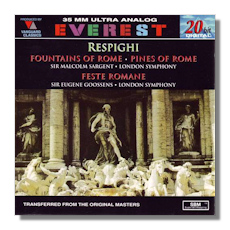
The Internet's Premier Classical Music Source
Related Links
-
Berlioz Reviews
Brahms Reviews
Respighi Reviews - Latest Reviews
- More Reviews
-
By Composer
-
Collections
DVD & Blu-ray
Books
Concert Reviews
Articles/Interviews
Software
Audio
Search Amazon
Recommended Links
Site News
 CD Review
CD Review
Everest Reissues

Johannes Brahms
- Symphony #3 in F Major, Op. 90 1
- Symphony #4 in E minor, Op. 98 2
1 Houston Symphony Orchestra/Leopold Stokowski
2 Pittsburgh Symphony Orchestra/William Steinberg
Everest EVC9016 AAD 76:53


Hector Berlioz
- Symphonie fantastique
London Symphony Orchestra/Eugene Goossens
Everest EVC9017 AAD 51:36


Ottorino Respighi
- The Fountains of Rome
- The Pines of Rome
- Feste Romane 1
London Symphony Orchestra/Malcolm Sargent
1 London Symphony Orchestra/Eugene Goossens
Everest EVC9018 ADD 61:06
As Vanguard Classics releases more titles in its series of Everest recordings from the late 50s and early 60s, comparisons with Mercury Living Presence and RCA Living Stereo reissues become more obvious. Vanguard has remastered these 35mm Everest originals using 20-bit digital technology, and the results are just as distinguished, sometimes more so, as those from the contemporary audiophile labels. Thick Brahmsian orchestrations come into focus, particularly at the low end, and brilliant effects like Berlioz's church bells in the Symphonie Fantastique and Respighi's riot of percussion in the "Roman Trilogy" get their piquant worth.
There are many collectors out there who have sentimental attachments to these performances, knowing full well that they are not the best available. I'm sure that many readers got their first taste of Berlioz from Goossens, their first Beethoven symphony cycle from Krips, and so on. Such is the case with me: Sargent's Respighi was my first and so it has a special place in my heart even though I've come to appreciate Reiner's Living Stereo and Doráti's Living Presence recordings of these works more. When I was growing up in the 60s, Everest LPs (not the original pressings but sub-standard remasterings) often could be had for less than four dollars, and so they were good library builders for poor but eager record collectors.
But now these recordings must be put into perspective. Stoki's Brahms Third (from 1959) provides equal measures of stimulation and frustration. The conductor usually chooses any tempo but the customary one, and so the first movement takes off with a breathless gasp and the final movement is weighed down under layers of pomposity. Surprisingly, Stoki's reading of the great Poco allegretto third movement is the least impassioned of any that I'm familiar with. Next to this, Steinberg's Fourth (1960) is workmanlike – a solid performance that has few faults, but few virtues that distinguish it from contemporary performances (notably Fritz Reiner's). The American orchestras acquit themselves well on this disc. Note that Steinberg and the Pittsburgh SO recorded all four Brahms symphonies, and that these were reissued on 2 MCa Classics CDs for the price of one. That "twofer" is worth tracking down, particularly for the budget-minded.
Goossens's Respighi was taped in 1958, and his Berlioz was taped a year later. These performances work in fits and starts. The London Symphony is guilty of many mushy ensemble attacks, and the conductor needs to drive them hard to get exciting music-making out of them; more introspective sections tend to wilt. The sleigh bells at the end of "The October Festival" are recorded so loudly that they lose all of their atmospheric effect. The bells in the Berlioz's final movement are good bit better, and this is the more recommendable of the two discs (but it still is no match for Charles Munch's RCA Living Stereo recording with the Boston Symphony Orchestra). Sargent's other two sections of the "Roman Trilogy" are clean-cut and a little staid. Again, reissues on Mercury Living Presence (Doráti) and RCA Living Stereo (Reiner) preserve superior performances. Sound quality remains the best reason to acquire these recordings.
Those wishing to suggest other Everest reissues might try contacting Vanguard Classics at Omega Record Group, Inc. (27 W. 72nd St., New York, NY 10023).
Copyright © 1996, Raymond Tuttle


















